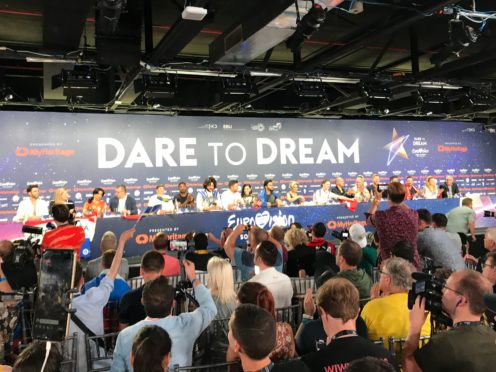Eurovision contestants will be obliged to take regular Covid-19 tests and must stay in their hotel except when they travel to the arena, according to new health and safety rules published ahead of the competition.
The annual song contest will take place in Rotterdam in May, with scaled-back international delegations, social distancing and strict hygiene measures.
Last year’s contest was cancelled due to the pandemic but in February it was announced the 20201 competition would go ahead but with strict protocols.
We're determined to "unite Europe on one stage" in Rotterdam.
That means the health and safety of everyone involved in this year's show is our top priority.
Read how we'll stay safe to #OpenUp 👉 https://t.co/ZfjNVVTVF9 pic.twitter.com/f0UeMjxU0e
— Eurovision Song Contest (@Eurovision) March 2, 2021
Performers, including UK entry James Newman, and all other attendees from abroad, will be recommended to go into quarantine for five days before departure to the Netherlands and they must test negative for Covid-19 within 72 hours of their flight.
Newman, the older brother of pop star John Newman, had been set to appear at last year’s contest before it was cancelled.
This year delegations have to stay in their hotel, except when they travel to Rotterdam’s Ahoy Arena for rehearsals, the live shows and other programme-related activities and everyone in the arena, including crew, artists and press, will be tested regularly in a special facility.
🇬🇧Representing the UK at @Eurovision 2021 is @JamesNewmanUK!More info 👉https://t.co/ekBi129l0z🎤#Eurovision pic.twitter.com/QzNBSX1Qmg
— BBC Eurovision🇬🇧 (@bbceurovision) February 19, 2021
Martin Osterdahl, the Eurovision Song Contest’s executive supervisor, said: “The spirit and tradition of the Eurovision Song Contest is about uniting Europe on one stage and we are very much still determined to achieve this in Rotterdam in May.
“We are moving forward with our plans to produce a safe Eurovision Song Contest, with all artists performing live in Rotterdam.
“This protocol demonstrates our commitment to make this happen, with the health and safety of everyone attending, including crew and press, our top priority.
Sietse Bakker, the show’s executive producer, added: “In recent months, a lot of hard work has been done behind the scenes on this extensive health and safety protocol, in order to allow us to stage this year’s Eurovision Song Contest in a responsible manner.
“With the help of extensive testing, mask-wearing, hygiene measures, attention to ventilation and innovative measures, we will create an environment in which crew, artists and the press can work as safely as possible.
“Our goal is clear: to prevent transmission of the virus during the event.
“If someone tests positive, our isolation protocol comes into effect, we support the relevant authorities with track and trace research and we take additional measures where necessary.
“If a participant is unable to perform live as a result, the backup recording will be used.”
The number of people in each delegation has been largely scaled back from previous editions.
The number of journalists who can attend the event will also be capped at 500 with a further 1,000 able to cover the show in a new online press centre.
A decision on whether an audience can be present at the shows will be made nearer the time.
Mr Osterdahl told the BBC Newscast podcast that celebrations from musicians will have to be more muted than in previous years.
“We want to avoid that people start hugging and kissing each other in spouts of happiness,” he said.
The grand final of the Eurovision Song Contest will take place on May 22.
